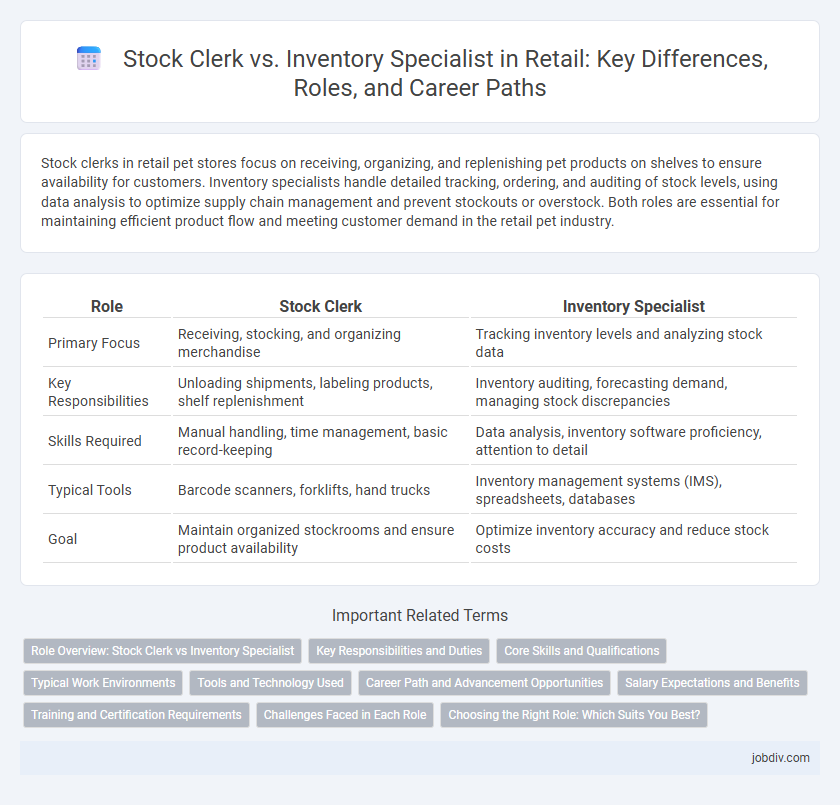Stock clerks in retail pet stores focus on receiving, organizing, and replenishing pet products on shelves to ensure availability for customers. Inventory specialists handle detailed tracking, ordering, and auditing of stock levels, using data analysis to optimize supply chain management and prevent stockouts or overstock. Both roles are essential for maintaining efficient product flow and meeting customer demand in the retail pet industry.
Table of Comparison
| Role | Stock Clerk | Inventory Specialist |
|---|---|---|
| Primary Focus | Receiving, stocking, and organizing merchandise | Tracking inventory levels and analyzing stock data |
| Key Responsibilities | Unloading shipments, labeling products, shelf replenishment | Inventory auditing, forecasting demand, managing stock discrepancies |
| Skills Required | Manual handling, time management, basic record-keeping | Data analysis, inventory software proficiency, attention to detail |
| Typical Tools | Barcode scanners, forklifts, hand trucks | Inventory management systems (IMS), spreadsheets, databases |
| Goal | Maintain organized stockrooms and ensure product availability | Optimize inventory accuracy and reduce stock costs |
Role Overview: Stock Clerk vs Inventory Specialist
Stock clerks primarily handle the receipt, organization, and stocking of merchandise on sales floors, ensuring products are accessible and properly displayed. Inventory specialists focus on monitoring stock levels, conducting regular audits, and managing inventory data to optimize product availability and reduce shrinkage. Both roles are critical in maintaining efficient retail operations but differ in scope, with stock clerks emphasizing physical handling and inventory specialists emphasizing data accuracy and control.
Key Responsibilities and Duties
Stock Clerks handle the receipt, organization, and replenishment of merchandise on store shelves, ensuring products are readily accessible for customers. Inventory Specialists focus on tracking stock levels through data analysis, conducting regular audits, and managing inventory records to prevent shortages or overstock. Both roles are crucial for maintaining efficient stock flow and supporting retail operations.
Core Skills and Qualifications
Stock clerks excel in organizing merchandise, restocking shelves, and maintaining inventory accuracy using basic inventory management software, requiring strong attention to detail and physical stamina. Inventory specialists possess advanced skills in data analysis, inventory forecasting, and supply chain coordination, often using ERP systems and requiring proficiency in Excel and inventory control methodologies. Both roles demand excellent organizational abilities, but inventory specialists typically require higher technical knowledge and experience in inventory optimization strategies.
Typical Work Environments
Stock clerks commonly work in retail stores, warehouses, and supermarkets where they handle product stocking, organization, and customer assistance. Inventory specialists typically operate in distribution centers, large retail chains, and manufacturing facilities, focusing on inventory management systems, stock level monitoring, and order processing. Both roles require familiarity with inventory software and efficient time management within fast-paced, detail-oriented environments.
Tools and Technology Used
Stock Clerks commonly use barcode scanners, handheld inventory devices, and basic point-of-sale (POS) systems to manage stock levels and process merchandise efficiently. Inventory Specialists leverage advanced inventory management software, RFID technology, and data analytics platforms to optimize stock accuracy, track product movement, and forecast reorder points. Both roles rely on digital tools, but Inventory Specialists utilize more sophisticated technology for strategic inventory control and reporting.
Career Path and Advancement Opportunities
Stock Clerks typically begin with entry-level duties such as organizing merchandise and assisting with stock replenishment, offering foundational experience in inventory management. Inventory Specialists advance by developing expertise in data analysis, inventory forecasting, and vendor coordination, positioning themselves for roles like Inventory Manager or Supply Chain Analyst. Career progression favors those who enhance technical skills and gain proficiency in inventory control software, enabling upward mobility within retail operations.
Salary Expectations and Benefits
Stock Clerks typically earn an average salary ranging from $25,000 to $35,000 annually, while Inventory Specialists command higher pay, often between $35,000 and $50,000 due to their advanced responsibilities in managing stock accuracy and reporting. Benefits for Inventory Specialists tend to include more comprehensive health plans, performance bonuses, and opportunities for career advancement, reflecting their critical role in retail operations. Stock Clerks generally receive standard benefits like employee discounts and basic health coverage, suited to entry-level positions with less complex duties.
Training and Certification Requirements
Stock clerks typically require basic on-the-job training with a focus on handling merchandise and maintaining stock levels, while inventory specialists often need advanced training in inventory management systems and data analysis. Certification programs such as Certified Inventory Specialist (CIS) or Certified in Production and Inventory Management (CPIM) enhance an inventory specialist's qualifications and career opportunities. Stock clerks generally do not require formal certification, making entry easier but limiting advancement without acquiring additional skills.
Challenges Faced in Each Role
Stock Clerks often contend with high physical demands, managing heavy merchandise and maintaining fast-paced shelf restocking under strict deadlines. Inventory Specialists face challenges in ensuring accurate data entry, tracking stock levels using sophisticated inventory management systems, and preventing discrepancies. Both roles require keen attention to detail, but Inventory Specialists typically deal with analytical challenges while Stock Clerks handle operational and logistical pressures.
Choosing the Right Role: Which Suits You Best?
Stock Clerks primarily handle receiving, stocking, and organizing merchandise on the retail floor, ensuring products are readily available for customers. Inventory Specialists focus on tracking stock levels, conducting audits, and managing data accuracy to prevent shortages or overstock situations. Choosing the right role depends on your strength in either hands-on physical tasks and customer interaction or analytical skills and attention to detail in inventory management.
Stock Clerk vs Inventory Specialist Infographic

 jobdiv.com
jobdiv.com